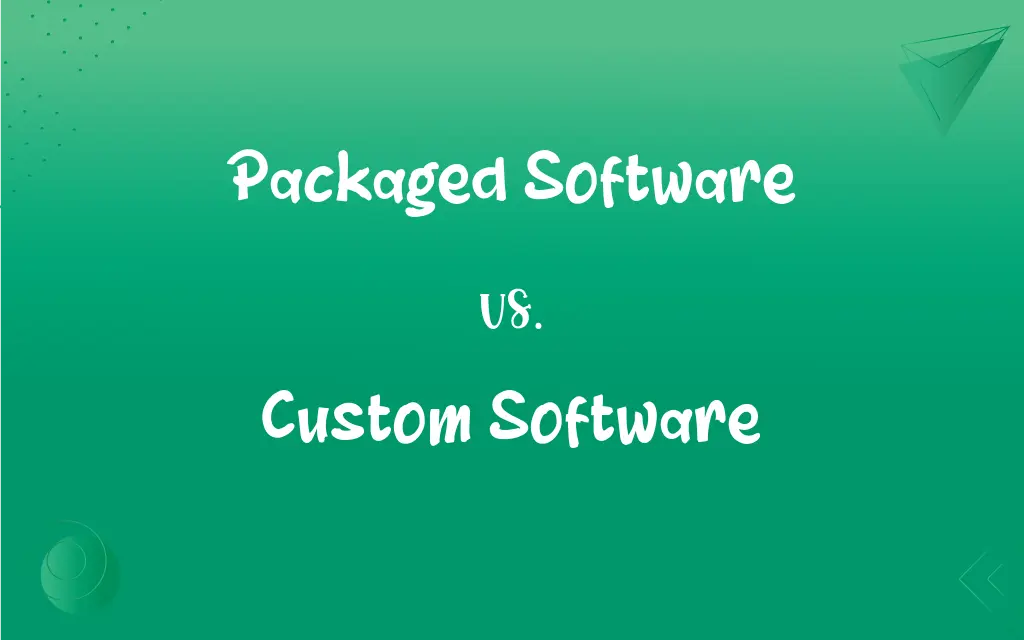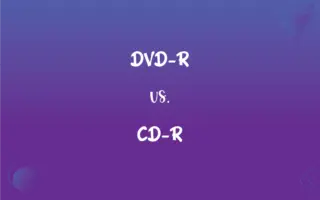Packaged Software vs. Custom Software: What's the Difference?
Edited by Janet White || By Harlon Moss || Updated on October 5, 2023
Packaged software is pre-built and ready-to-use, whereas custom software is specifically developed to meet unique business needs.

Key Differences
Packaged software offers off-the-shelf solutions that address general applications and are readily available for users. Custom software, in contrast, is tailored to the precise specifications and requirements of the client or user. This distinction fundamentally alters their approach towards functionality and usability.
Packaged software is typically available immediately and often comes at a lower upfront cost. In contrast, custom software necessitates a development period and generally requires a more substantial initial investment. The difference in time and financial expenditure often influences an organization’s choice between the two.
Packaged software is designed to cater to a broad audience, providing functionalities that aim to be useful to a wide user base. Custom software, however, is sculpted to meet the exact needs of an organization or user, and can be scaled or modified as the organization evolves. Thus, specificity and scalability become key differentiators in the utility of packaged versus custom software.
Packaged software may present challenges in integrating with existing systems or applications within an organization due to its generic nature. Custom software can be engineered to integrate seamlessly with current systems, offering a synchronized environment. Therefore, integration and compatibility are pivotal points when navigating the options of packaged and custom software solutions.
Comparison Chart
Cost
Generally less expensive with upfront pricing.
Typically involves a higher investment and development cost.
ADVERTISEMENT
Time to Implement
Can be implemented immediately.
Requires a development period before implementation.
Customization Level
Limited to available features and settings.
Can be fully tailored to specific business needs.
Integration
May have limitations in system integrations.
Can be developed for seamless integration with existing systems.
User Specificity
Designed for broad, general use without specificity.
Designed with detailed specificity for the user/organization.
Packaged Software and Custom Software Definitions
Packaged Software
Packaged software typically comes with set features, aiming to cater to a wide audience.
The business utilized packaged software to access standardized project management tools.
ADVERTISEMENT
Custom Software
Custom software typically demands a higher initial investment than packaged alternatives due to bespoke development.
The firm allocated a substantial budget to develop custom software that automated their unique workflow.
Packaged Software
Packaged software is ready-made software available for purchase or download.
She bought packaged software to manage her small business’s finances.
Custom Software
Custom software is uniquely designed software that caters to specific user requirements.
The company invested in custom software to accommodate its intricate inventory management needs.
Packaged Software
Packaged software is generally more cost-effective and faster to deploy than custom solutions.
The startup opted for packaged software to swiftly deploy their customer management system without excessive costs.
Custom Software
Custom software can offer proprietary tools and functionalities that are not available in off-the-shelf solutions.
The custom software included specialized algorithms that were crucial for the research team’s data analysis.
Packaged Software
Packaged software often involves licensing agreements dictating usage and distribution.
The company ensured to comply with the licensing terms of the packaged software, avoiding illegal distribution.
Custom Software
Custom software provides a high degree of adaptability and scalability according to evolving business needs.
The enterprise scaled its custom software to support expanding customer data as the company grew.
Packaged Software
Packaged software may offer various versions with different features to choose from.
The graphic designer purchased a premium version of the packaged software to access advanced editing tools.
Custom Software
Custom software often involves a development process tailored to one organization’s or user’s specifications.
Their custom software was developed over six months to ensure alignment with all business processes.
FAQs
How is custom software defined?
Custom software is tailored software, specifically developed to meet the particular requirements of an individual user or organization.
How quickly can packaged software be deployed?
Packaged software can generally be deployed immediately after purchase.
What is packaged software?
Packaged software is pre-built, ready-to-use software designed for a wide range of users and generic applications.
How does the maintenance of custom software typically work?
Maintenance of custom software usually involves a service agreement with the developers for ongoing support, updates, and troubleshooting.
How often is packaged software updated?
Update frequencies for packaged software depend on the vendor and can range from frequent updates to very few.
Is packaged software more secure than custom software?
Security can vary; packaged software may be targeted more due to wider use, while custom software might offer security through obscurity and tailored protections.
Is custom software better for unique operational requirements?
Generally, yes. Custom software can be designed to meet unique operational requirements that packaged software may not accommodate.
Is custom software proprietary to the business it's designed for?
Typically, yes. Custom software is developed for specific users or organizations and is usually proprietary to them.
How scalable is packaged software?
Packaged software usually has fixed features and may not be inherently scalable to accommodate growing business demands.
Can packaged software handle niche industry requirements?
Packaged software may struggle with niche or specialized requirements due to its generalized functionalities.
Is custom software only developed for large enterprises?
No, custom software can be developed for any size of business, from small enterprises to large corporations, depending on their needs and budget.
What is the typical cost difference between packaged and custom software?
Packaged software usually has a lower upfront cost, while custom software often demands a higher initial investment due to bespoke development.
What is the usual development time for custom software?
Custom software development time can vary widely based on complexity and specific user requirements, often taking several months or more.
Is packaged software suitable for specific business needs?
Packaged software may not fully cater to specific or niche business needs due to its generalized design.
Can custom software be adapted as the business evolves?
Yes, custom software can typically be modified or scaled to meet evolving business needs and challenges.
Is customer support typically available for packaged software?
Yes, packaged software often comes with customer support, although the extent and quality can vary by vendor.
Does custom software generally require a longer implementation phase?
Yes, custom software often requires a development and testing phase, extending the implementation timeline.
Can custom software integrate with existing business systems?
Yes, custom software can usually be developed to integrate seamlessly with existing business systems and technologies.
Can packaged software be customized?
Packaged software may offer limited customization through configurable settings but cannot be fundamentally altered or tailored.
Can packaged software be used by multiple businesses?
Yes, packaged software is designed to be utilized by multiple users and businesses across various sectors.
About Author
Written by
Harlon MossHarlon is a seasoned quality moderator and accomplished content writer for Difference Wiki. An alumnus of the prestigious University of California, he earned his degree in Computer Science. Leveraging his academic background, Harlon brings a meticulous and informed perspective to his work, ensuring content accuracy and excellence.
Edited by
Janet WhiteJanet White has been an esteemed writer and blogger for Difference Wiki. Holding a Master's degree in Science and Medical Journalism from the prestigious Boston University, she has consistently demonstrated her expertise and passion for her field. When she's not immersed in her work, Janet relishes her time exercising, delving into a good book, and cherishing moments with friends and family.
































































